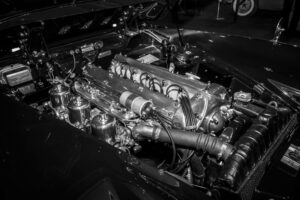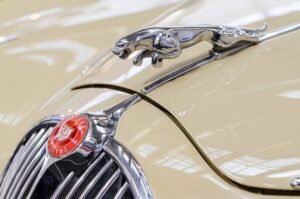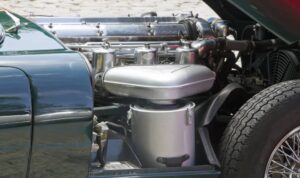Weekdays 8:00am-5:00pm Sat Closed Sun Closed

A Jaguar is a strong animal that rules its environment and is also luxury vehicle brand. Jaguars have long been the driver's machine, with superb mechanical components intended for sheer driving pleasure, recognized because of their brilliant design, engineered for superior performance and prestige.
However, as with any mechanical device, these cars are with flaws. And because it is a premium vehicle, its issues also come with a luxurious servicing price tag. Once a Jaguar engine fails, it can cost you a lot of money. Not only that, it could also encounter transmission failure, overheating, coolant loss, and engine issues, among several other common problems with Jaguar cars.
The most current Jaguar vehicle models use automatic transmissions, especially the ZF 8HP or 6HP boxes in previous versions. Although this is a generally reliable gearbox, it has its share of challenges. The transmission in Jaguar vehicles is notorious for having difficulty changing gears, switching modes, and producing grinding noises and clunks while shifting.
Once this issue happens, a complete rebuild is essential if you want your Jaguar to work as new. While most transmission issues have been resolved in newer vehicles, older ones fail.

Overheating and losing coolant in your car is inconvenient and can result in engine failure. These problems are widespread in Jaguar vehicles because of plastic coolant reservoirs that break and leak coolant. If you detect coolant puddling beneath your vehicle, take it to a repair shop immediately for Jaguar servicing and repair, as the problem will most likely exacerbate from there.
A shortage of coolant may lead to overheating, which is absolutely and can destroy your engine. Overheating can make the aluminum cylinder heads in almost every Jaguar model slightly bend. A substantive and costly mechanical repair will be required to restore your engine's full operational capabilities.
The issue with Jaguar's wheel nuts is straightforward and involves the materials used for wheel nut covers. Once the wheel nut cap is subjected to low or high temperatures and corrosion, it deforms, rendering a wrench difficult to fit. As a result, taking the wheel of the car gets impossible.
Once wheel nuts become caught or deformed, removing them with normal tools is nearly impossible, and you will need to hire a tow truck.
Poor timing chains are the most common engine faults in Jaguar vehicles. The chain itself isn't the problem; the plastic stresses in the chain can make it rattle and ultimately snap, destroying the engine.
You might be encountering this issue if you hear a rattling sound upon cold starting the engine. The solution is to replace the whole chain assembly with a more modern, long-lasting one.

Another transmission-related issue is the so-called "never needs changing" transmission fluid or oil. As a result, numerous European automakers have constructed vehicles with closed gearbox systems over the past few years. These safe systems were designed never to require fresh fluids or fluid changes.
However, these newly developed closed systems only sometimes function as expected. Instead, at the 60,000-mile mark, these modern transmission systems may require new fluids. The lack of a transmission fluid dipstick is a drawback of these closed systems. As a result, there must be a mechanism to check fluid quality or levels in your garage. As a result, transmission repairs can instantly get expensive and labor-intensive.
Owners of Jaguar S vehicles manufactured between 2000 and 2004 have raised concerns regarding ignition coil replacements. The ignition coil is essential for transmitting energy from the battery to the distributor. This function is critical for producing fire or sparks inside the engine. You may force the car to drive if it's got ignition system issues, but this is not recommended.
The good thing is that if found early, replacing the ignition coil in Jaguar auto repair would cost around $400. Unresolved, this issue can lead to larger issues like misfires, stopping, etc. These and other ignition problems should activate the check engine light on your dashboard. This issue should be handled as soon as possible because thorough engine repair would cost over $400.
Jaguar vehicles, renowned worldwide for their unrivaled combination of style, elegance, and high-speed performance, are sometimes criticized due to braking system flaws. Some owners have complained about excessive braking noise, premature brake wear, and a less responsive brake pedal, which can be unpleasant and detract from the driving experience. Premature brake wear is a typical complaint, which could be ascribed to the Jaguar vehicles' high-performance nature.

These automobiles require more from their brakes because of their speed and power, leading to faster wear and tear than standard vehicles.
Similarly, brake noise, frequently called constant grinding and squeaking once the brakes are used, could indicate worn rotors or brake pads. This problem is especially prevalent in high-performance automobiles like Jaguars. While the sound is usually more annoying than dangerous, it may suggest that brake replacement or maintenance is needed.
Nevertheless, a less sensitive brake pedal might have severe consequences. Some Jaguar owners have discovered that their cars demand more braking force before slowing down. Many things, including faulty brake lines, brake fluid leakage, or brake booster troubles, could cause this problem. Such problems can impair the vehicle's stopping power and endanger its safety.
In addition, some Jaguar models have had issues with the (ABS) or Anti-lock Braking System. ABS is a vital safety feature that prevents the wheels from locking up (and the car from skidding) once braking forcefully. System defects, conversely, could induce anomalies in brake application and risk the vehicle's control during critical periods that could result in an accident.
Jaguars can occasionally experience electronic component, system, and sensor difficulties. Some features have ceased operating, while others receive warning lights and signs for something still operational.
Such a situation will necessitate the involvement of electronic experts, who will decide whether the problem is serious or only a few blown fuses.
Jaguar is a perfect example of a luxury sports automobile that only sometimes lasts long. While it's difficult to predict how long your Jaguar will last on average, it will be at most 100,000 miles.
Some Jaguars have been observed with mileage between 125,000 and 150,000 miles, but they are uncommon. Forbes published a list of automobiles that'll last over 200,000 miles, with the only mention of Jaguar being to underline how this brand will not get you anywhere near that mileage.
Fortunately, Jaguars offer a great warranty that'll assist you in maintaining the condition of your vehicle. Each Jaguar comes with a 5-year/60,000-mile new car limited coverage guarantee, which will be useful if a manufacturing issue arises. However, these vehicles necessitate extensive routine maintenance, and if problems arise due to a lack of care on the owner's side, the guarantee will not assist.
Yes, certain Jaguar models are unquestionably more reliable compared to others. The Jaguar S-Type, for instance, is a model car that should be avoided if dependability is your major concern. Because the brand's reliability ratings have improved in recent years, several of the most dependable Jaguar models are newer.

The Jaguar XF is a significantly safer option than the Jaguar S-Type, with fewer breakdown frequency and repair costs. This model is expensive to repair and requires frequent maintenance because it breaks down often. Fortunately, several more recent models outperform this one in terms of dependability.
The Jaguar XK is the most robust Jaguar available right now. It boasts the highest Reliability Index score of any Jaguar, at 116, suggesting somewhat higher reliability than the industry standard. If you can get a used Jaguar XK, we encourage you to do so.
Whenever we say that Jaguar has enhanced the longevity of their vehicles in the past few years, we mean quite lately. In 2015, new management took over the company to improve the brand's dismal reliability scores. This is when they implemented the previously mentioned 5-year/60,000-mile warranty and started to prioritize safety features in their vehicles.
It also helps that Jaguar's unique technology has grown more common in recent years, cutting repair costs and expanding availability to speedy modifications. If you wish to purchase a Jaguar, look into its history and see if its repair expenses are cheaper than the brand's average.

